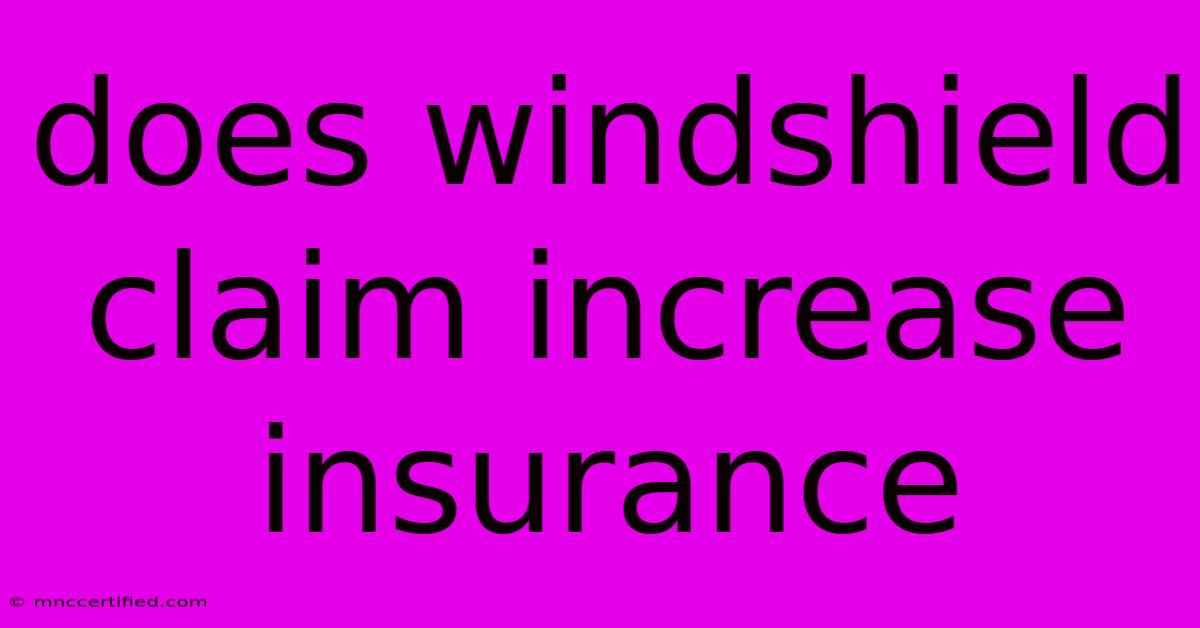Does Windshield Claim Increase Insurance

Table of Contents
Does a Windshield Claim Increase Your Car Insurance?
It's a question that pops up in many a car owner's mind: will filing a windshield claim affect my insurance rates? The answer, while not always straightforward, can be summarized as: it depends.
Here's a breakdown of the factors that influence whether your insurance rates will go up after a windshield claim:
Factors Affecting Insurance Rates After a Windshield Claim
- Your Insurance Company: Different insurance companies have different policies and claim-handling practices. Some companies may have a "no-fault" system for windshield claims, where you can file a claim without affecting your premium. Others might factor in the claim even if it's a relatively minor repair.
- Your Insurance Policy: Review your policy's terms and conditions. Some policies may have specific clauses related to windshield claims, such as a deductible or a limit on the number of claims you can file.
- Your Driving History: If you have a history of multiple claims, even minor ones, your insurance company might view you as a higher risk and raise your rates.
- The Cost of the Repair: While a windshield replacement is usually a relatively small cost, it's still factored into your insurer's overall risk assessment.
- State Laws: Some states have specific laws regarding windshield claims and their impact on insurance rates.
When a Windshield Claim is Less Likely to Increase Rates
- Comprehensive Coverage: Most car insurance policies include comprehensive coverage, which covers damage to your vehicle caused by events like theft, vandalism, or natural disasters. Windshield damage is typically covered under comprehensive coverage.
- No Deductible: If your policy has a deductible for comprehensive coverage, you'll need to pay that amount out-of-pocket before your insurance kicks in. If the cost of the windshield repair is less than your deductible, you may be better off paying for the repair yourself.
- Glass Coverage: Some insurance companies offer optional "glass coverage," which specifically covers windshield damage. This type of coverage may have a lower deductible or no deductible at all, making it a more affordable option for windshield repairs.
When a Windshield Claim is More Likely to Increase Rates
- Multiple Claims: Filing multiple claims, even for minor repairs, can raise your risk profile in your insurer's eyes.
- High-Risk Driving: If you have a history of speeding tickets, accidents, or other driving violations, your insurer may be more likely to raise your rates after a windshield claim.
- Costly Repairs: If the windshield damage is extensive, such as a crack that requires a full replacement, it could be considered a more significant event and potentially impact your rates.
How to Minimize the Impact of a Windshield Claim
- Shop Around: Get quotes from multiple insurance companies to compare rates and coverage options.
- Consider a Deductible: If you have a deductible for comprehensive coverage, consider increasing it to lower your monthly premium. Just be sure to choose a deductible that you can comfortably afford in case you need to file a claim.
- Opt for Glass Coverage: Consider adding glass coverage to your policy if you're concerned about windshield damage. This coverage can often provide lower deductibles or even no deductible at all, which can help you save money in the long run.
- Maintain a Good Driving Record: Avoid speeding tickets, accidents, and other driving violations to maintain a good driving record and keep your insurance rates low.
Conclusion
Whether or not a windshield claim increases your car insurance is not a one-size-fits-all answer. By understanding the factors that influence your insurance rates, you can make informed decisions about how to handle windshield damage and minimize any potential impact on your premiums.
Remember, it's always a good idea to contact your insurance company directly to discuss your specific policy and coverage options.

Thank you for visiting our website wich cover about Does Windshield Claim Increase Insurance. We hope the information provided has been useful to you. Feel free to contact us if you have any questions or need further assistance. See you next time and dont miss to bookmark.
Featured Posts
-
Europa League Live Man United Vs Paok
Nov 08, 2024
-
Us Fed Rate Cut Powell Resignation Unlikely
Nov 08, 2024
-
Sutton National Insurance Company Bamboo
Nov 08, 2024
-
Fc Barcelona And Codorniu New Collaboration
Nov 08, 2024
-
Chelsea Vs Noah Conference League Live Stream Guide
Nov 08, 2024